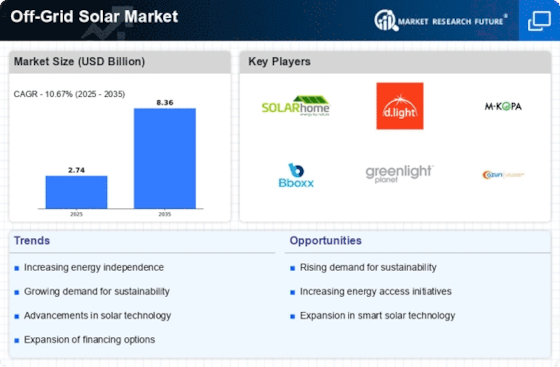Market Share
Off-Grid Solar Market Share Analysis
The Off-Grid Solar Market is a rapidly growing sector, driven by the increasing demand for clean and reliable energy solutions in regions with limited access to the grid. Market share positioning strategies play a crucial role in determining the success of companies operating in this dynamic space.
One common strategy employed by companies in the Off-Grid Solar Market is differentiation. Companies strive to distinguish their products from competitors by offering unique features or innovative technologies. This could involve incorporating advanced battery storage solutions, enhancing energy efficiency, or introducing user-friendly design elements. By providing distinct advantages, companies can carve out a niche for themselves in the market, attracting customers who value specific attributes in their off-grid solar systems.
Another key market share positioning strategy is cost leadership. In an industry where affordability is often a deciding factor for consumers, companies seek to become the low-cost providers without compromising on quality. Achieving economies of scale in manufacturing, optimizing supply chain processes, and leveraging partnerships for bulk procurement are common tactics to drive down costs. By offering competitive pricing, companies can capture a significant share of the market and appeal to price-sensitive customers, particularly in emerging economies.
Strategic partnerships and collaborations also play a pivotal role in shaping market share in the Off-Grid Solar Market. Companies often form alliances with governments, non-profit organizations, or local businesses to expand their reach and impact. Collaborating with local entities can help companies navigate regulatory challenges, access distribution networks, and gain insights into the unique needs of specific regions. These partnerships not only enhance market penetration but also contribute to the development of sustainable and tailored solutions for diverse off-grid communities.
Moreover, a customer-centric approach is vital for market share positioning in the Off-Grid Solar Market. Understanding the needs and preferences of end-users allows companies to tailor their products and services accordingly. Customer education and engagement initiatives are essential to create awareness about the benefits of off-grid solar solutions and build trust among potential consumers. Providing excellent customer support and after-sales services further solidify a company's position in the market, fostering customer loyalty and positive word-of-mouth.
Innovation is a driving force in the Off-Grid Solar Market, and companies that invest in research and development gain a competitive edge. Continuous improvement and the introduction of cutting-edge technologies ensure that companies stay ahead of the curve, attracting customers who value efficiency, reliability, and sustainability. Staying abreast of technological advancements and adapting products to meet evolving market demands are integral components of a successful market share positioning strategy.
Lastly, geographic diversification is a strategic approach employed by companies seeking to minimize risks and tap into varied markets. The Off-Grid Solar Market is not homogeneous, with different regions presenting unique challenges and opportunities. Companies that strategically expand their presence across diverse geographic locations can mitigate risks associated with market fluctuations, regulatory changes, or environmental factors.
The Off-Grid Solar Market is characterized by its dynamic nature, and market share positioning strategies play a pivotal role in determining the success of companies operating in this space. Differentiation, cost leadership, strategic partnerships, customer-centric approaches, innovation, and geographic diversification are key elements that companies leverage to carve out their niche and thrive in a market driven by the increasing demand for sustainable energy solutions.


















Leave a Comment